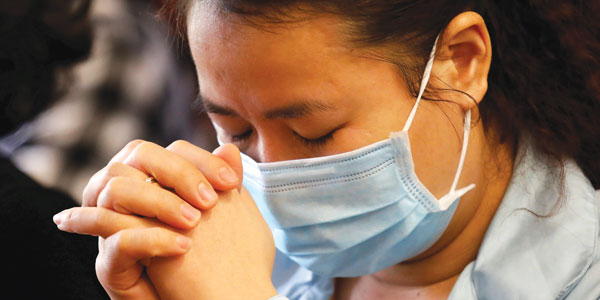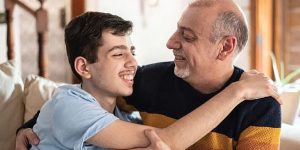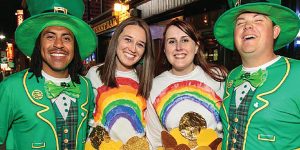
A few churches across the nation defied state and local bans and public health guidelines and held in-person Easter services Sunday. Ironically, a congregation in Chesterfield, Va., announced on Easter Sunday the death of their pastor. He’d refused to shutter the church and had continued to preach, flouting warnings about the dangers of large gatherings. The pastor was quoted by local media as saying, “I firmly believe that God is larger than this dreaded virus.” He contracted COVID-19 and died Saturday night, church elders reported. His wife also tested positive for the virus.
In Central, La., upwards of 500 worshippers of all ages attended their church’s Easter services. Before and afterward, they milled around outside the church and in the parking lot, local media reported. It angered neighbors and Louisiana Gov. John Edwards who called the churchgoers “selfish and irresponsible.” He accused them of “stealing the time and attention of first responders and making it much more likely than this disease will continue to spread.”
Louisiana continues to be a COVID-19 crisis zone. As of late on April 14, the state had 21,518 confirmed cases of the coronavirus and 1,013 deaths.
Here in the metro, at least one church – Saint Luke’s Lutheran Church in Kansas City, Kan., held in-person Easter services. The church pastor and congregation ignored Gov. Laura Kelly’s order limiting religious and funeral services to 10 people.
Wyandotte County is the state’s COVID-19 hot spot with more cases and deaths than anywhere else in the state, including far larger counties. As of Tuesday morning, Wyandotte had 345 confirmed COVID-19 cases and 29 deaths.
Religious leaders bear heavy responsibility. They’re typically respected and trusted by community members and political leaders. Faith communities are the “largest and best-organized civil institutions in the world, claiming the allegiance of billions of believers and bridging the divides of race, class and nationality,” according to the Health Communication Capacity Collaborative (HC3).
“Especially at the family and local levels, religious leaders have the power to raise awareness and influence attitudes, behaviors and practices. They can shape social values in line with faith-based teaching,” observed the HC3.
Religious leaders have a responsibility not only to the faithful but to their communities to encourage and uphold compliance with social distancing and strict adherence to state and local bans and public health guidelines. Respect for the greater good must inform their conduct.
The faithful believe that God will help and guide us, but we know, too, that we must help ourselves, guided by the advice of health experts. God, we believe, is everywhere; we can pray anywhere.
Teaching his disciples to pray, Jesus said in (ESV) Matthew 6:5-15, “When you pray, you must not be like the hypocrites. For they love to stand and pray in synagogues and at the street corners, that they may be seen by others … But when you pray, go into your room and shut the door and pray to your Father who is in secret. And your Father who sees in secret will reward you.”
And then Jesus taught them the Lord’s Prayer.
Rezando en casa, rezando en cualquier lugar
Algunas iglesias en todo el país desafiaron las prohibiciones estatales y locales y las pautas de salud pública y celebraron los servicios de Pascua en persona el domingo. Irónicamente, una congregación en Chesterfield, Virginia, anunció el domingo de Pascua la muerte de su pastor. Se había negado a cerrar la iglesia y había seguido predicando, haciendo caso omiso de las advertencias sobre los peligros de las grandes reuniones. Los medios locales citaron al pastor diciendo: “Creo firmemente que Dios es más grande que este temido virus”. Contrajo COVID-19 y murió el sábado por la noche, informaron los ancianos de la iglesia. Su esposa también dio positivo por el virus.
En Central, La., más de 500 fieles de todas las edades asistieron a los servicios de Pascua de su iglesia. Antes y después, se reunieron afuera de la iglesia y en el estacionamiento, informaron medios locales. Enfureció a los vecinos y al gobernador de Luisiana, John Edwards, quien llamó a los feligreses “egoístas e irresponsables”. Los acusó de “robar el tiempo y la atención de los socorristas y hacer que sea mucho más probable que esta enfermedad continúe propagándose”.
Luisiana sigue siendo una zona de crisis COVID-19. Hasta el 14 de abril, el estado tenía 21,518 casos confirmados de coronavirus y 1,013 muertes.
Aquí en el área metropolitana, al menos una iglesia, la Iglesia Luterana de San Lucas en Kansas City, Kansas, celebró los servicios de Pascua en persona. El pastor y la congregación de la iglesia ignoraron la orden de la gobernadora Laura Kelly de limitar los servicios religiosos y funerarios a 10 personas.
El condado de Wyandotte es el más afectado por el COVID-19 del estado con más casos y muertes que en cualquier otro lugar del estado, incluidos los condados mucho más grandes. Hasta el martes por la mañana, Wyandotte tenía 345 casos confirmados de COVID-19 y 29 muertes.
Los líderes religiosos tiene una gran responsabilidad. Por lo general, los miembros de la comunidad y los líderes políticos los respetan y confían en ellos. Las comunidades religiosas son las “instituciones civiles más grandes y mejor organizadas del mundo, que tienen la lealtad de miles de millones de creyentes y unen las divisiones de raza, clase y nacionalidad”, según Health Communication Capacity Collaborative (HC3).
“Especialmente a nivel familiar y local, los líderes religiosos tienen el poder de crear conciencia e influenciar actitudes, comportamientos y prácticas. Pueden moldear los valores sociales de acuerdo con la enseñanza basada en la fe”, observó el HC3.
Los líderes religiosos tiene una responsabilidad no sólo con los fieles sino también con sus comunidades para alentar y mantener el cumplimiento del distanciamiento social y el estricto cumplimiento de las prohibiciones estatales y locales y las pautas de salud pública. El respeto por el bien común debe informar su conducta.
Los fieles creen que Dios nos ayudará y nos guiará, pero también sabemos que debemos ayudarnos a nosotros mismos, guiados por el consejo de expertos en salud. Dios, creemos, está en todas partes; podemos rezar en cualquier lugar.
Enseñando a sus discípulos a orar, Jesús dijo en (ESV) Mateo 6:5-15: “Cuando oras, no debes ser como los hipócritas. Porque les encanta estar de pie y rezar en las sinagogas y en las esquinas de las calles, para que otros puedan verlos … Pero cuando reces, entra a tu habitación y cierra la puerta y reza a tu Padre que está en secreto. Y tu Padre que ve en secreto te recompensará”.
Y luego Jesús les enseñó la Oración del Señor.









